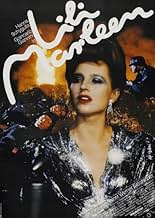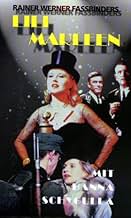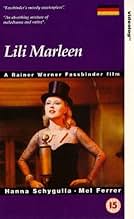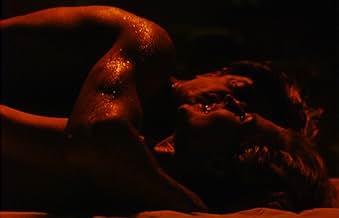AVALIAÇÃO DA IMDb
7,1/10
4,4 mil
SUA AVALIAÇÃO
Em 1938, uma cantora alemã se apaixona por um compositor judeu em Zurique, que ajuda os judeus a fugir da Alemanha nazista. Ela quer ajudar, mas é obrigada a voltar para a Alemanha.Em 1938, uma cantora alemã se apaixona por um compositor judeu em Zurique, que ajuda os judeus a fugir da Alemanha nazista. Ela quer ajudar, mas é obrigada a voltar para a Alemanha.Em 1938, uma cantora alemã se apaixona por um compositor judeu em Zurique, que ajuda os judeus a fugir da Alemanha nazista. Ela quer ajudar, mas é obrigada a voltar para a Alemanha.
- Prêmios
- 1 vitória e 4 indicações no total
Karl-Heinz von Hassel
- Henkel
- (as Karl Heinz von Hassel)
Raúl Gimenez
- Blonsky
- (as Raul Giminez)
Enredo
Você sabia?
- CuriosidadesShot in English for American distribution; later dubbed in German
- Erros de gravaçãoAfter attempting suicide, Willie is seen performing "Lili Marleen" in the Berlin Sportpalast as part of a deal with the Nazis, dazzlingly dressed in front of thousands, and the event is transmitted live. Then suddenly all is held up by the announcement that all German forces have surrendered (VE Day, May 8, 1945). Of course, in the final months of the regime no-one would bother about arranging a sumptuous live transmission of music; by this time, Berlin was a heap of rubble.
- ConexõesFeatured in Century of Cinema: Die Nacht der Regisseure (1995)
- Trilhas sonorasLili Marleen
(German Version)
(based on a poem from the 1915 book "Die kleine Hafenorgel" by Hans Leip)
Music By Norbert Schultze,
Vocals Hanna Schygulla
(p) 1981 Schlicht Musikverlag, Phonogram, GmbH, DRG Records, Inc., Philips
© Metropolis Records
Published By Brampton Music Ltd., Chappell Music Ltd., Peter Maurice Music,
EMI Music
Avaliação em destaque
Rainer Werner Fassbinder always made movies as if he knew his was on borrowed time. Many of the 44 films made by him in his 16-year career represent searches, experiments, attempts to express himself as an artist in the most diverse cinematic ways. 'Lili Marleen', made in 1981, the penultimate year of his life, belongs to a cluster of several films that are apparently less radical than most of the others and closer to mainstream cinema. After the success of some of his movies in previous years, Fassbinder was able to secure financing for more expensive productions with international casts and many extras. He chooses to make 'Lili Marleen', a story woven around the famous song that sounded in the trenches of the Second World War, both German and Allied (one of the famous versions belongs to Marlene Dietrich) and somewhat inspired by the autobiographical book of Lale Andersen, the German singer who first recorded the song on disc. Apparently, it is a melodrama that improbably embellishes her biography. In fact, we also find in this film the story of a woman who has to face alone the dark forces of the surrounding society combined with Fassbinder's sarcastic vision of the history of 20th century Germany.
The film's lead character, Willie, is a blonde, Aryan, German singer who doesn't seem to know or care much about what's going on in Germany in 1938. She performs in a cabaret in Zurich and falls in love with Robert, a wealthy young Jew, whose family is involved in the anti-Nazi resistance fight and in the rescue of the remaining Jews in Germany. Willie's father opposes the relationship and maneuvers so that the young woman cannot return to Switzerland after a trip to Germany. Forced to earn a living in Nazi Germany, Willie records the song 'Lili Marleen', which after the outbreak of war and the occupation of much of Europe and North Africa by the Nazis becomes a hit listened to by German soldiers and later by the Allies when they will disembark in Europe. The relationship between Willie and Robert continues, and the singer, forced to make artistic compromises and collaborate with the Nazis, begins to open her eyes and get involved in the fight against Nazism.
As in many of Fassbinder's films, the female characters are much stronger, more nuanced and better defined than the male characters. The lead role is interpreted by the exceptional Hanna Schygulla, Fassbinder's favorite actress. Her Willie is carefree at first, eager to live her life, a fighter for survival using her art and feminine charms as weapons. Above all, however, she is in love, but times of war crush destinies and love stories. Robert and his father are ambiguous characters and Fassbinder has been criticized for this, but also for nuancing the characters on the other side of the conflict, the Nazi officers. My opinion is that artistically the choice was appropriate, and the film must be seen from the director's sarcastic perspective, fascinated but also critical of the anti-cultural kitsch of 20th century Germany. As in many of his other films, Fassbinder also appears in a cameo role, as head of the anti-Nazi resistance, perhaps also to emphasize his personal position. 'Lili Marleen' is a film less appreciated by critics and Fassbinder experts. I consider it among his best films.
The film's lead character, Willie, is a blonde, Aryan, German singer who doesn't seem to know or care much about what's going on in Germany in 1938. She performs in a cabaret in Zurich and falls in love with Robert, a wealthy young Jew, whose family is involved in the anti-Nazi resistance fight and in the rescue of the remaining Jews in Germany. Willie's father opposes the relationship and maneuvers so that the young woman cannot return to Switzerland after a trip to Germany. Forced to earn a living in Nazi Germany, Willie records the song 'Lili Marleen', which after the outbreak of war and the occupation of much of Europe and North Africa by the Nazis becomes a hit listened to by German soldiers and later by the Allies when they will disembark in Europe. The relationship between Willie and Robert continues, and the singer, forced to make artistic compromises and collaborate with the Nazis, begins to open her eyes and get involved in the fight against Nazism.
As in many of Fassbinder's films, the female characters are much stronger, more nuanced and better defined than the male characters. The lead role is interpreted by the exceptional Hanna Schygulla, Fassbinder's favorite actress. Her Willie is carefree at first, eager to live her life, a fighter for survival using her art and feminine charms as weapons. Above all, however, she is in love, but times of war crush destinies and love stories. Robert and his father are ambiguous characters and Fassbinder has been criticized for this, but also for nuancing the characters on the other side of the conflict, the Nazi officers. My opinion is that artistically the choice was appropriate, and the film must be seen from the director's sarcastic perspective, fascinated but also critical of the anti-cultural kitsch of 20th century Germany. As in many of his other films, Fassbinder also appears in a cameo role, as head of the anti-Nazi resistance, perhaps also to emphasize his personal position. 'Lili Marleen' is a film less appreciated by critics and Fassbinder experts. I consider it among his best films.
- dromasca
- 23 de nov. de 2023
- Link permanente
Principais escolhas
Faça login para avaliar e ver a lista de recomendações personalizadas
- How long is Lili Marleen?Fornecido pela Alexa
Detalhes
- Data de lançamento
- País de origem
- Idiomas
- Também conhecido como
- Lili Marleen
- Locações de filme
- Empresas de produção
- Consulte mais créditos da empresa na IMDbPro
Bilheteria
- Orçamento
- DEM 10.500.000 (estimativa)
- Faturamento bruto nos EUA e Canadá
- US$ 8.144
- Fim de semana de estreia nos EUA e Canadá
- US$ 11.623
- 16 de fev. de 2003
- Faturamento bruto mundial
- US$ 8.148
- Tempo de duração1 hora 51 minutos
- Mixagem de som
- Proporção
- 1.66 : 1
Contribua para esta página
Sugerir uma alteração ou adicionar conteúdo ausente

Principal brecha
By what name was Lili Marlene (1981) officially released in Canada in English?
Responda

































